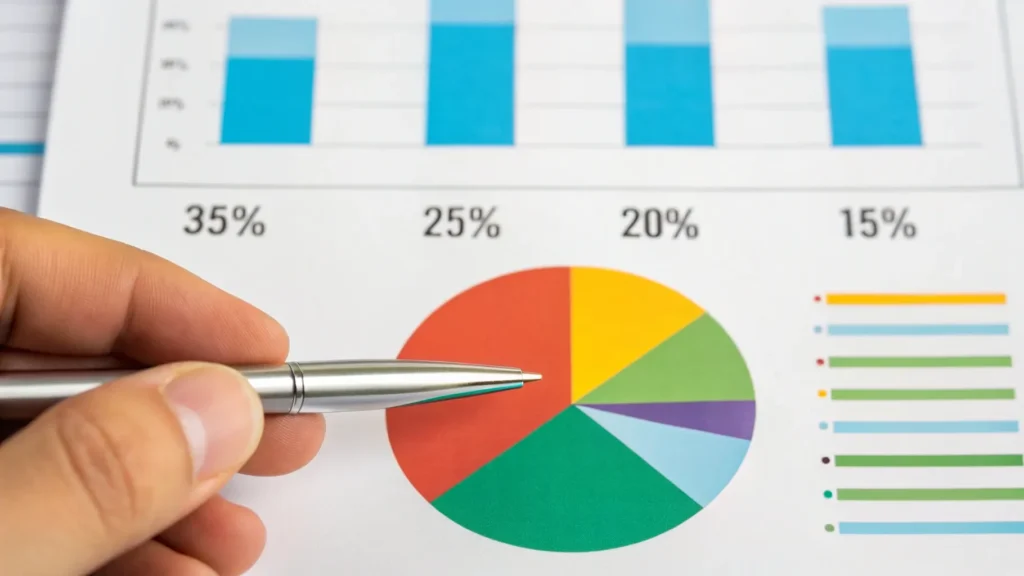How Data Analytics Help Business Performance Find Out Here!
Oktarina
August 18, 2025
12 min read

Ever wondered if data analytics can make more money for your business? Well, it turns out it can! Data analytics is more than just a buzzword in the tech world—it’s a powerful tool that helps businesses make better decisions, understand their customers better, and grow in the long term. Whether you’re a small startup or a large enterprise, having the correct data can give you the insights to stay ahead of the competition. Data analytics helps you uncover valuable insights that can guide everything from marketing strategies to operational improvements. It’s a must-have for modern business success.
In this article, we’ll dive deep into how data analytics can help business performance, explore its real-world impact on different business areas, and show you how to implement data analytics in your own organization. Ready to take your business to the next level? Let’s get started!
What is Data Analytics: A Game Changer for Businesses
In today’s fast-paced world, businesses are surrounded by data—sales figures, customer feedback, website traffic, and social media activity. The key to making sense of all this information is data analytics. But what is it and how can it help your business?
At its core, data analytics is collecting, processing, and analyzing data to find insights that help businesses make better decisions. Data science is crucial in transforming business strategies and enabling advanced analytics techniques that drive innovation and growth. Instead of guessing, data analytics lets businesses use real facts to improve operations, make better decisions, and understand their customers. This ability to use data to guide strategies gives firms a competitive advantage. The data analytics process is a structured methodology for turning raw data into actionable insights, optimizing workflows, and enabling data-driven decision-making.
The first step is data collection—gathering information from various sources like sales records, customer surveys, and social media. Once collected, the data needs to be cleaned to ensure it’s accurate and relevant for analysis. Then, software tools like Google Analytics or Power BI help visualise and analyze the data in simple charts or graphs so you can spot trends and patterns.
Once the data is visualised, businesses can interpret it to find insights. Data analysts and scientists play key roles in extracting these insights, using their expertise and software tools to uncover trends and opportunities. These insights can show customer preferences, trends, or areas where the business needs to improve. For example, a retailer can use data to understand what products are popular and adjust inventory accordingly. Similarly, data can help companies to optimise pricing or identify areas where costs can be cut. Ultimately, data analytics is a powerful tool that helps businesses make decisions based on facts, not assumptions. Businesses can optimise processes, improve customer experience, and grow by using data. In today’s competitive market, it’s a game-changer for success.
How Data Analytics Can Help Business Performance

Now that we understand data analytics, let’s dive deeper into how data analytics can help business performance. Leveraging data analytics allows organizations to optimize business operations and processes, leading to greater efficiency and reduced costs. By analyzing data, companies gain valuable insights that inform and refine business strategies, supporting more intelligent decision-making and driving growth. Data analytics can be used to improve business performance in many ways, from enhancing customer experiences to streamlining operations and identifying new opportunities. From smarter decision making to improving customer experience and optimising operations, here’s how it can drive your business forward.
1. Smarter Decision Making
One of the key benefits of data analytics is the ability to provide businesses with the information to make smarter, data driven decisions. Instead of guessing, businesses can analyze customer behavior, sales patterns, and market trends to make informed business decisions.
For example, a retail store can analyze sales data to see which products are in high demand and adjust their inventory accordingly. This process involves identifying trends and patterns in customer behavior, which helps businesses stay ahead of market changes. By understanding these trends, businesses can identify trends and identify patterns to forecast opportunities and avoid costly mistakes that could hurt their bottom line.
2. Customer Experience
Data analytics is also a powerful tool to improve customer experience. By analyzing customer data, businesses can better understand consumer behavior and customer trends, allowing them to personalize their offerings to meet specific needs and preferences. This leads to a more tailored, engaging experience that keeps customers coming back.
Take Netflix for example. By analyzing users’ viewing habits, Netflix provides personalized show and movie recommendations which keeps users engaged and increases retention rates. Similarly, e-commerce platforms use data to recommend products based on past purchases, creating a personalized shopping experience that feels more relevant and convenient to customers. Analyzing customer data in this way not only helps identify customer trends but also supports customer retention by enabling personalized experiences and effective loyalty campaigns. This kind of targeted marketing increases customer satisfaction and loyalty, both of which contribute to higher sales and long-term success.
3. Operational Efficiency
Another big advantage of data analytics is the ability to improve operational efficiency. By evaluating and analysing internal processes, businesses can identify inefficiencies and take steps to streamline their operations. Data analytics is also used for streamlining operations and optimizing business processes, enabling organizations to make better decisions and enhance overall performance.
For example, logistics companies use data analytics to optimise delivery routes, saving on fuel costs and improving delivery times. Data analytics also helps these companies identify bottlenecks in workflows, allowing them to address delays and improve efficiency. Similarly, manufacturers can analyse data from their equipment to predict when maintenance is needed, preventing costly breakdowns and minimising downtime. By uncovering inefficiencies, businesses can reduce operational costs, improve productivity, and ultimately reduce costs.
4. Revenue Growth and Pricing Optimisation
Data analytics plays a big role in revenue growth by helping businesses optimise their pricing strategies. Financial forecasting and forecasting future trends using predictive modeling are essential for anticipating changes in the market and making informed decisions. With predictive analytics, businesses can forecast demand and adjust pricing accordingly so they’re maximising revenue while remaining competitive.
For example, e-commerce platforms can use predictive modeling based on actual data to predict when demand will peak during certain seasons and adjust their prices and promotions to take full advantage of the increased interest. By anticipating market trends, businesses can ensure they’re making the most out of high demand periods without overpricing or underpricing their products and stay competitive and increase profits.
5. Risk Mitigation
Data analytics also helps businesses minimise risks such as fraud, market volatility or customer churn. However, implementing data analytics requires careful planning to avoid risks like misinterpreting analytics data or relying on poor-quality sources, which can lead to resource wastage and incorrect decisions. By continuously analysing analytics data, businesses can identify potential issues early on and take steps to mitigate them before they become big problems.
For example, banks use real-time data analytics, leveraging both financial data and analytics data, to monitor transactions for signs of fraud and assess risk. By detecting suspicious activity quickly, banks can take immediate action to prevent financial losses. Similarly, businesses can analyse customer data to spot patterns that suggest potential churn. This allows businesses to implement retention strategies, prevent customers from leaving, and maintain long-term relationships and steady revenue streams.
Read more: How Data Analytics Help Business Boost Profitability? Find Out Here!
Real World Examples of Data Analytics Improving Business Performance

To really see how data analytics can help business performance let’s take a look at how different industries have successfully implemented data driven strategies to improve their operations and outcomes.
- Retail: Inventory and Sales Optimisation
In retail, data analytics helps businesses ensure they have the right products in stock at the right time. By analysing sales data, businesses can predict which products will be in demand and adjust their inventory accordingly. For example, a store can use past sales data to see which items are popular during certain seasons and ensure they have enough stock to meet demand. This reduces the risk of running out of popular items or having too much of less popular ones. Big data analytics and analyzing raw data allow retailers to identify data patterns in customer purchases, which provides a competitive edge by enabling more accurate forecasting and targeted marketing. - Hospitality: Customer Experience
In the hospitality industry, data analytics helps improve pricing and customer service. Hotels can use data to adjust room prices based on demand—raising prices during peak seasons and lowering them during slower periods. This maximises revenue. Additionally, by analysing customer preferences and feedback, hotels can offer more personalised services. For example, if a guest regularly requests a specific type of room or amenities, the hotel can prepare those preferences in advance for future stays and improve guest satisfaction and loyalty. - Finance: Fraud Prevention and Risk Management
In finance, data analytics is used to detect fraud and manage risk. By monitoring transactions in real-time, banks can spot unusual activity and take action immediately to prevent fraud. For example, if a large transaction is made unexpectedly, data analytics can flag it for review. Beyond fraud prevention, banks also use data to assess risk when lending. By analysing credit scores, transaction history and market trends, they can make smarter decisions about lending and reduce financial risk for both the bank and its customers. Data analytics professionals and other skilled professionals play a crucial role in interpreting financial data, ensuring accurate analysis and supporting informed decision-making. - Manufacturing: Predictive Maintenance
For manufacturers, data analytics helps predict when machines need maintenance and prevent unexpected breakdowns that could disrupt production. By collecting data from equipment sensors, businesses can identify issues before they happen and schedule repairs in advance. This reduces downtime and ensures smoother operations and greater efficiency and cost savings. Labor statistics and business strategy in manufacturing are increasingly informed by data analytics, helping companies align workforce planning and operational goals with industry trends and performance data.
How to Implement Data Analytics for Business Success
Data analytics can improve your business performance but you need to do it right. Businesses can leverage different data analytics approaches—descriptive, diagnostic, predictive, and prescriptive—to gain insights and guide decision-making. Here are five simple steps to help you use data analytics effectively and get the best results.
- Set Clear Objectives
Start by figuring out what you want to achieve with data analytics. Do you want to increase sales, cut costs or improve customer satisfaction? Having clear goals will help you focus on the areas that matter most to your business. For example if you’re looking to increase sales you might analyse purchasing trends while if you’re looking to cut costs you’ll focus on optimising operations. Clear objectives will guide your data analysis and ensure it aligns with your business goals. - Collect Reliable Data
Data is only useful if it’s accurate and relevant. Begin by gathering data from trusted sources like your CRM system, website analytics or customer surveys. Once you have the data make sure it’s clean—remove any duplicates, errors or irrelevant information. Clean data will ensure your analysis is reliable and you can make the right decisions based on accurate insights. - Choose the Right Tools
Select the right tools that match your business needs. Tools like Google Analytics, Power BI and Tableau are great options to visualise and analyse your data in a way that’s easy to understand. Choose tools that are simple to use and integrate with your existing systems. The right tool will make it easier to gain insights and turn them into actionables. - Explore Ways Data Analytics Can Be Applied
Consider the various ways data analytics can be used across different business functions, such as enhancing customer experiences, optimizing marketing strategies, or improving operational efficiency. Applying data analytics in multiple areas helps maximize its impact. - Develop Expertise
You need the right skills on your team to interpret and use the data. You can train your current team or hire data analysts to dig into the data and pull out insights. By developing expertise within your team you’ll be able to understand data trends and make growth driven decisions. - Start Small and Scale Up
Begin with small projects like customer feedback or sales data. This will get you comfortable with data analytics without overwhelming your team. Once you’ve seen the benefits and gained insights you can scale up to other areas of your business like marketing or supply chain.
Read more: Benefits of Data Analytics in Business for Growth and Efficiency
Analyse Your Data for Business Growth with Juara Production!
Data analytics is a powerful tool to improve decision making, operational efficiency and profitability all of which lead to better business performance. By understanding and using data businesses can make smarter choices, streamline processes and uncover growth opportunities that may have been missed. Whether it’s predicting customer behaviour, optimising inventory or refining marketing strategies data analytics plays a big role in driving a business to success.
Ready to unlock the full potential of data analytics and grow your business? Juara Production is the trusted partner you need. With our Analytics and Data services we offer customised data analytics solutions for your business. Our expertise covers data collection and analysis to visualisation and strategy development so you can make data driven decisions that drive growth. With us you can optimise processes, refine strategies and improve your bottom line.
So what are you waiting for? Don’t let valuable insights slip away. Contact Juara Production today for a consultation and find out how our data analytics solutions can drive your business!





